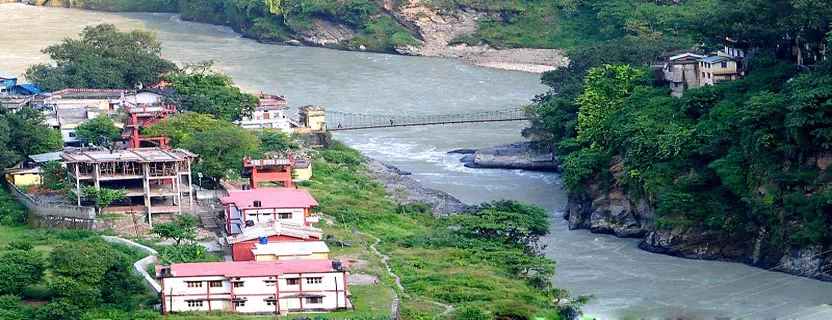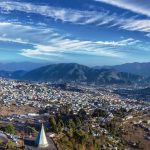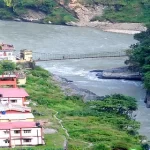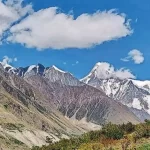Jhulaghat is a small town located in the Pithoragarh district of Uttarakhand, India. It is situated near the India-Nepal border and is known for its natural beauty, cultural significance and historical importance.
Location: Jhulaghat is situated in the Pithoragarh district of Uttarakhand, near the India-Nepal border.
Best time to Visit: March to June (spring) and September to November (autumn) are the best times to visit Jhulaghat, with pleasant weather and clear skies.
How to reach Jhulaghat:
- By Air: Nearest airport is Pantnagar, from here you can take bus or hire taxi to Jhulaghat.
- By Train: Nearest railway station is Tanakpur(140km) with buses and taxis available.
- By Road: Jhulaghat is connected to Pithoragarh, Almora, and Delhi by bus and taxi.
Attractions:
- Jhulaghat Bridge: A historic suspension bridge over the Kali River.
- Kali River: Offers stunning views, fishing, and rafting opportunities.
- Nepal Border: Jhulaghat is a key point on the India-Nepal border.
- Pithoragarh Fort: A historic fort located nearby.
- Narayan Ashram: A spiritual retreat center located near Jhulaghat.
Things to do:
- Trekking: Explore the surrounding hills and go trekking in the nearby areas.
- Fishing: Try your hand at fishing in the Kali river.
- Rafting: Experience white-water rafting in the Kali River.
- Cultural tours: Take a cultural tour of the local villages and learn about the customs and traditions of the people.
- Historical tours: Visit the Pithoragarh fort and other historical sites in the area.
- Photography: Capture the beautiful scenery and natural beauty of the area through photography.
- Birdwatching: Go birdwatching in the nearby jungles.
- Camping: Set up camp in the nearby jungles and enjoy the natural surroundings.
- Local Cuisine: Try the local cuisine and experience the flavors of the region.
Cultural Significance: Jhulaghat has a rich cultural significance due to its strategic location on the India-Nepal border and its history of trade and cultural exchange between the two countries. Some aspects of its cultural significance:
- Indo-Nepalese Culture: Jhulaghat is a melting pot of Indian and Nepalese cultures, with influences from both sides visible in its language, cuisine, music, and art.
- Traditional Festivals: The town celebrates traditional festivals like Makar Sankranti, Holi, Diwali, and Navratri with great fervor, showcasing its rich cultural heritage.
- Folk Music and Dance: Jhulaghat is known for its folk music and dance forms like Jhora, Chappeli, and Langvir, which are an integral part of its cultural identity.
- Handicrafts: The town is famous for its handicrafts like woolen carpets, handmade paper and wooden carvings, which reflects its rich cultural traditions.
- Cuisine: Jhulaghat’s cuisine is a unique blend of Indian and Nepalese flavors, with popular dishes like Dal-bhat, momos, and selroti.
- Language: The local language, Kumauni is spoken by the inhabitants, which is a dialect of the Pahadi language.
- Scenic beauty: Jhulaghat is surrounded by picturesque hills, valleys and rivers making it a haven for nature lovers and photographers.
Spiritual Significance: Jhulaghat has a significant spiritual importance due to its:
- Narayan Ashram: This ashram is a spiritual retreat center that attracts seekers from around the world.
- Ancient Temples: Jhulaghat is home to several ancient temples dedicated to various deities, showcasing its rich spiritual heritage.
- Pilgrimage Site: The town is a pilgrimage site for devotees of Lord Shiva, with several Shiva temples and a sacred Shiva linga.
- Yoga and meditation: Jhulaghat’s serene environment and natural beauty make it an ideal location for yoga and meditation retreats.
- Spiritual Festivals: The town celebrates various spiritual festivals like Maha Shivratri, Navratri, and Diwali with great fervor.
- Sacred Rivers: The Kali River, which flows through, Jhulaghat is considered sacred and is believed to have purifying properties.
Accommodation:
- Local hotels and lodges
- Guesthouses
- Homestays
- Camping: Set up tents near the Kali River or in nearby villages
Conclusion: Jhulaghat is a hidden gem offering a unique blend of natural beauty, cultural richness, and spiritual significance. Located on the India-Nepal border, it showcases a fascinating cultural melting pot, with ancient temples, ashrams and sacred rivers making it a hub for spiritual seekers. Surrounded by picturesque hills, valleys and rivers, Jhulaghat provides a serene environment for yoga, meditation and adventure activities like trekking and rafting, making it an offbeat destination for nature lovers, culture enthusiasts and spiritual seekers alike.





